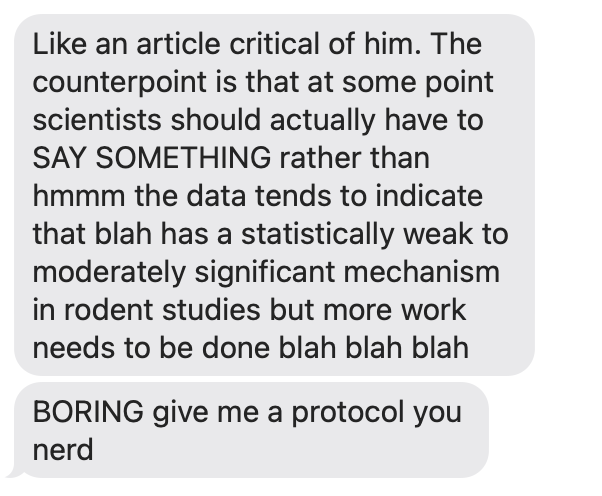Continue Reading
Biggest Finance Newsletter for Women
Join 200,000 other people interested in money, power, culture, and class.
Subscribe
Late last year in a one-woman attempt to save legacy media, I paid $70 for an annual print subscription to New York Magazine. (In all honesty, I was hoping physical reading material I couldn’t Command-T away from would provide a more ~tactile~ experience, and so far, I feel like a 19th century poet every time I sit down with an op-ed.) This meant that, last week, the story that broke biohacking hearts nationwide was in my hands, and Andrew Huberman’s big, puppyish eyes were staring up at me from my open mailbox.
I’m not as interested in relitigating the claims in the piece about what happened after he gained fame and a cult following, as much as I am intrigued by what led to his fame and cult following in the first place.
The writer, Kerry Howley, nailed his allure: “Huberman offered…a plan to structure your day. A plan for waking. For eating. For exercising. For sleep. At a time when life had shifted to screens, he brought people back to their corporeal selves…the subtext was always the same: We may live in chaos, but there are mechanisms of control.” Those mechanisms of control, also known as his “protocols,” issued digestible prescriptions for living.
After a re-read, I began flipping through the pages of a previous issue I hadn’t finished (turns out I still need to work on the physical equivalent of a “Command-T,” closing the magazine, and picking up my Small Screen instead) and discovered a story I hadn’t seen making the rounds on Twitter. It was very similar, but like the mirrored opposite—the parallel universe of Howley’s exposé.
>
“Both Huberman and Kennedy educate acolytes numbering in the millions about specific ways to engage with some of the most ‘I don’t know, it depends’ areas of our lives: health and parenting.”
It was about a woman named Dr. Becky Kennedy and her 2.4 million followers on Instagram (a number that’s now 200,000 higher since the story was published, me among them). Kennedy is a child psychologist-turned-parenting icon, and like Huberman, she possesses the charisma and institutional credentials that make her easy to trust. She’s known chiefly for her theory (method?) of, among other things, “sturdy parenting.” Her business, Good Inside, provides parents with resources and community—with answers—in one of the most uncertain aspects of human life.
From what I could discern during a close read of the story, sturdy parenting is different from traditional parenting in the sense that it doesn’t emphasize discipline and consequences, and yet it’s different still from the new-age “gentle parenting” because it emphasizes enforcement of boundaries. Her business model is enormously profitable: She has 48,000 subscribers who each pay $276 per year, which I—you already know—calculated to mean $13M in recurring annual subscription revenue.
Despite my child-free status, I consumed an unspeakable number of her videos with great enthusiasm. She’d set up a scenario (“Your kid won’t get off the shed!”) and play-act the wrong response (mostly yelling). And? I’d think, anxiously awaiting the big reveal, What should I say instead?, ready to take mental notes of her response. (“I’ve asked you to get off the shed. I’m going to come over there now. If by the time I am there, you are not off the shed, I’m going to physically remove you.”) Noted. Her straightforward, highly specific advice was revelatory. Does she do adult interactions, too?
I perused her comments section where the volume and caliber of discourse stunned me—followers largely guiding one another, adding their own insights—and observed the way Dr. Becky always seemed to have a directive to share. The experience left me feeling as though I had been sturdy-parented.
But there was a passage in the piece that struck me as eerily similar as I basked in the afterglow of the Huberman piece: “[Kennedy’s parenting methodology as a] trend has grown in tandem with the increasing precariousness of everyday life…that nagging, unanswerable question of what constitutes enough is what has given rise to the Dr. Becky phenomenon. Among many of today’s parents, there is a twin desire: for reassurance that they’re doing their best and for guidance on how to do better.”
My comparison of these two is not to imply there’s anything sinister going on with Dr. Becky, of course, just that both Huberman and Kennedy educate acolytes numbering in the millions about specific ways to engage with some of the most “I don’t know, it depends” areas of our lives: health and parenting.
Even before the Huberman Harem was revealed, the (very little) public scrutiny he did face mostly pertained to the conclusiveness with which he presented information. His scientific claims were sometimes backed only by “limited animal studies,” and his critics pointed out that he had a habit of “posit[ing] certainty where there is ambiguity.”
My husband was at work when he read the Huberman piece, and we were texting about the claims. I asked him how he felt about religiously following directions that may or may not be truly scientifically proven.

“BORING give me a protocol you nerd” is how I’m going to begin responding to ambiguous emails.
The problem is, we—the masses—don’t like ambiguity. Not to mention the fact that ambiguity does not a hit podcast make! When it comes to high-stakes, low-confidence areas of our lives, we’re willing to cede total accuracy for certainty. (I’m sure you can see where I, Money with Katie, am going with this.)
We don’t want correlations. We want action steps! We want someone to tell us what to do. “Give us a protocol, you nerd” is the rallying cry of the content creation age.
In my own job, I often feel most uncomfortable in the moments where I sense my beliefs sound too dogmatic. Money is right up there alongside health and parenting with “things that really do depend,” but as ole’ Hubes, Kennedy, and one of the only personal finance influencers to have millions of subscribers, Dave Ramsey, know, there’s great economic value in prescriptive certainty. Ramsey’s “Baby Steps” are an iconic example of this formulaic approach.
These experts are comforting and magnetic because they have a solution for everything: Morning, low-angle sunlight as a way to “promote early-day cortisol release” (content warning: The linked citation features unsettling illustrations of a younger Huberman smoldering through his morning routine and is laden with AG1 ads; proceed with caution). “Sturdy parenting,” rather than punishment, as the correct way to enforce boundaries and discipline. Saving $1,000 as your beginner emergency fund as the step you must take before doing anything else.
These are things that can be easily summarized in a PDF (something I inadvertently realized while hunting for citable examples, only to find that the Google search suggestions often returned “pdf” with the keyword).
>
“There’s great economic value in prescriptive certainty.”
As luck would have it, there’s even an episode of Huberman Lab wherein Dr. Becky Kennedy joins to discuss “parenting protocols!” (The first question he asks her: Can you give us some steps for determining how good of a parent we are?)
Part of this is just plain practical. People have looked to philosophers to make sense of the world since Ancient Greece. What are Huberman, Kennedy, and Ramsey if not modern-day philosophers with better ecommerce practices? There’s less functional utility in people with wishy-washy, sometimes-contradictory takes who just kick around ideas without making any assertions. We want the seven steps, not “the seven considerations you might want to consider if you fit this narrow band of circumstances.”
Our search for certainty explains why some people prefer to pay down a mortgage with a 2.75% interest rate rather than deposit extra cash into the stock market. These are nearly identical choices from the standpoint of how they impact your daily financial life (i.e., you’re sending money to an institution that you can no longer spend), but one promises certainty and the other does not.
You know what happens when you pay down the debt faster—you save 2.75% in interest on each dollar of principal paid down. The stock market guarantees no such thing. You could make a contribution to an investment account and lose 10% that year, or make 30%. While we mostly know the average return is somewhere in the 7% per year ballpark, it involves more of a leap of faith than debt paydown.
(This is my grand unifying theory about why some people are so good at paying down debt aggressively but struggle to flip the switch to aggressive wealth-building—it requires being comfortable with risk, with taking decisive action in the face of uncertainty.)
In that sense, uncertainty is just another word for risk—and most of us are not keen on risking the wellbeing of our health, finances, and kids with a free-wheeling approach, so anyone who seems credible and confident enough is a decent candidate for the person who gets to tell us what to do.
>
“There’s a certain texture our differences lend us as a collective that keeps things lively and interesting.”
So what’s the risk? Perhaps a monoculture of sorts. If we’re all drinking the same synthetic health powder and parenting in identical ways and approaching our money with the same cut-and-dry blueprint, maybe we all really will be better off: living in a world full of healthy, well-regulated, debt-free automatons. But I don’t know—it seems like there’s a certain texture our differences lend us as a collective that keeps things lively and interesting; new discoveries and breakthroughs that can only be made if there’s not just one correct way of being healthy, parenting kids, or managing money.
Conceiving of these experts and their suggestions as “take what you like, leave what you don’t” tools has always seemed the healthiest way to engage with these titans of ideas. But it would be pretty hypocritical for me to offer you a prescriptive takeaway here, so instead, I’ll conclude by saying this: I suppose the only difference between ancient philosophers and modern-day ones is that the ancient ones believed there were no answers, only questions.
April 8, 2024
Looking for something?
Search all how-to, essays, and podcast episodes.
Explore
While I love diving into investing- and tax law-related data, I am not a financial professional. This is not financial advice, investing advice, or tax advice. The information on this website is for informational and recreational purposes only. Investment products discussed (ETFs, index funds, etc.) are for illustrative purposes only. It is not a recommendation to buy, sell, or otherwise transact in any of the products mentioned. Do your own due diligence. Past performance does not guarantee future returns.
Money with Katie, LLC.
Terms & Conditions | Privacy Policy
This Site Was Built by Brand Good Time



